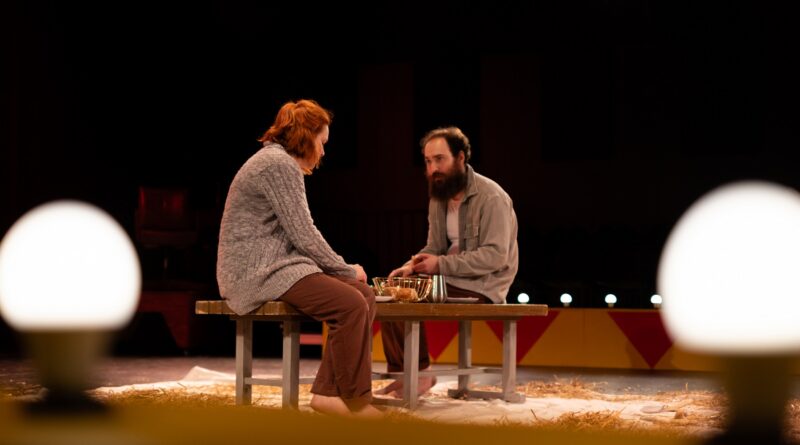“Dead Elephants” challenges us to become something else
“You either stand in your grave or become something else.”

A grieving mother speaks these words just before her apotheosis in playwright Alexander Offord’s new play Dead Elephants. The line sums up both the play’s central conceit and the daunting challenge it offers to spectators.
If you are ready to meet its challenge, Dead Elephants explores existential earworm ideas through stellar performances by actors Allan Cooke, Hayden Finkelshtain and Nicole Wilson. After this show, you may leave the theatre under your own power . . . but Dead Elephants is coming with you.
The play, which is performed by experimental theatre company Good Old Neon, is a haunting, often harrowing exploration of the ends of things . . . and how we discover, create or nurture the meaning and vitality in them. The sparse set has the sad feel of an abandoned circus. Audience members sit on three sides of the stage area behind short walls topped by non-functioning vintage neon circus lights.
The play opens when two circus barkers (Finkelshtain and Wilson, in the first of their many roles) shimmy out to debate and consider just what this play “Dead Elephants” might be about. They riff on all of the things we associate with elephants – their strength, prodigious memory and ability to grieve; the ivory trade and their love of peanuts. None of that is the point.
We are watching the process of a play being considered, calculated . . . and birthed – and as we will see, this is the largest, most meta example of a restless determination not to let dead things stand, but to see them “become something else.”
So first, this is a play about creating a play . . . which requires locating its focus and its starting point. There is more than one possibility for this, as we will be shown.
This is also a play about what counts: what qualifies for consideration – for inclusion in a play like this, in the broader march of history, or just in our memories. After all, as the circus barkers note, the majority of dead elephants are ahistorical. Whether by violence or old age, they pass, unseen and unknown, into the great beyond. So there is an arbitrariness and an accidental quality to the elevation and reconsideration of the stories of several particular dead elephants focused on in the play.

During the Siege of Paris in 1870, we will see a pair of starving French soldiers plot to kill and eat the elephants in the city zoo. We will also hear about P.T. Barnum’s famous elephant Jumbo, who was struck and killed by a train in St. Thomas, Ontario in 1885. And in the most disturbing and fully explored story, we will travel to Coney Island in 1903, where an elephant named Topsy was electrocuted. Her publicly filmed execution became the earliest recorded footage of the moment of death.
What makes the deaths of these elephants especially worthy of notice?
And while we’re asking . . . what about the infant daughter of a young contemporary couple – whose story is interlaced with the time-jumping tales of the elephants? She died after just three days of life. Does she count? If so, how much does she count for? In what ways? And at what cost to her parents, who are played by a heart-wrenchingly effective Finkelshtain and Wilson?
The specific stories of these elephants and humans, which fascinate and disturb, stand in stark contrast to the non-story of the play’s one non-human character. Allan Cooke plays a cooing, caterwauling, man-sized wingless pigeon. An unsettling presence, he is sitting on stage and shuffling around when the audience enters before the play begins. And he remains at the end after the audience departs like the eternal, interchangeable essence of all pigeons everywhere all at once undergoing an endless cycle of birth, life, death, decomposition and reanimation. Cooke’s hooked finger-claws and piercing eyes shred the fourth wall while his cooing, clucking bird voice convulses our imaginations.
And as we ponder what counts – and why – Dead Elephants makes us see that death is more than an anodyne ending. It can be the result of debased action and heartless agency – as we see in the leadup to Topsy’s infamous execution. It can be engineered, planned, fetishized and profited from. And it can be inflected and rationalized in different ways: for instance, there is unsatisfying discussion about whether the dead or soon-to-be-dead elephants are good or bad – and whether, as a result, they somehow deserve their fate.
And finally, as the play pushes on, jumping back and forth between its interlaced plots, the alternative to death – the idea of becoming “something else” – looms larger. The grieving mother, played by Nicole Wilson, resists standing in her daughter’s grave, or in her own. Topsy, torn from her mother and then reborn in America after months in the dark hold of a ship, resists nobly the death engineered for her. And in his interchangeable eternality, our perpetually circling pigeon also resists.

Dead Elephants features powerhouse performances by Finkelshtain and Wilson – who are utterly compelling in roles that span deep vulnerability, crass commercialism, lust, technical expertise and budding philosophy – and by Cooke, who relentlessly circles, pecking at our certainties and polite sensibilities.
Yet Dead Elephants is also a relatively static, talky experience. Tiny and elegant interlacements of its four disparate plots can be found: for instance, in the elephants stencilled on the drapes of the dead infant’s room.
But when all is said and done, you will wrestle with Dead Elephants’ rich, confounding, and episodically-presented materials yourself. And you will either stand in a grave of confusion . . . or become something else.
Dead Elephants, directed by Nicole Wilson, continues until March 17, 2024 at the Aki Studio Theatre in Daniels Spectrum. Click here to book tickets.
© Scott Sneddon, Sesayarts Magazine, 2024
About The Author
Scott Sneddon
Scott Sneddon is Senior Editor on SesayArts Magazine, where he is also a critic and contributor.
Visit About Us > Meet the Team to read Scott’s full bio …



